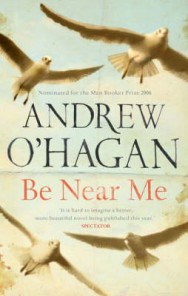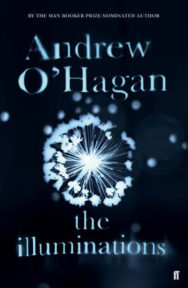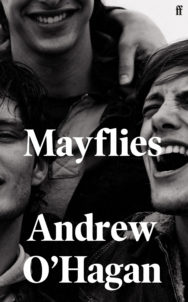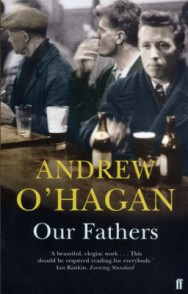‘I wanted to write a funny, true, and heartbreaking book that showed a friendship in its entirety.’
Andrew O’ Hagan is one of Scotland’s most talented and interesting writers and his latest novel, Mayflies, is garnering praise across the board. BooksfromScotland caught up with him to talk about his favourite books.
Mayflies
By Andrew O’ Hagan
Published by Faber
The book as . . . memory. What is your first memory of books and reading?
In our house, you had more chance of spotting a mountain gazelle than a book. My parents didn’t read, and life, for them, seemed to carry enough distractions and entertainment to keep them going. But for me reading was a kind of religion. It raised you to the higher ground. In school, I pored over my first reading books as if they were Wisdom Itself. I’m talking about books called things like Dick, Dora, Nip, and Fluff. It was a steady, exhilarating climb from there. I remember, when still small, reading Wuthering Heights, and feeling that I saw human beings on the page for first time — romantic, unreasonable, beautiful, despairing. Just like life, only better. I was hooked.
The book as . . . your work. Tell us about your latest book Mayflies. What did you want to explore in writing it?
I wanted to write a funny, true, and heartbreaking book that showed a friendship in its entirety. From beginning to end, the book relates to my own life, and I wanted that autobiographical urgency to perfume the story. We meet two Scottish boys in Mayflies, two funny kids growing up in Ayrshire, and they are full of attitude, music, politics, plans, and hurts — they rush into the world in the hope of making it better. And what do they find? How does their childhood closeness affect their adulthood? These are questions for everybody, and when, in the book, one of the boys telephones the other one, 30 years later, with terrible news, loyalty and love are tested. As I say, it’s my most personal book, and I felt in writing it that I was telling a story everybody really interested in human experience could relate to.
The book as . . . inspiration. What is your favourite book that has informed how you see yourself?
My favourite book changes every day. Today it is The Strange Case of Dr Jekyll and Mr Hyde. Robert Louis Stevenson had such a wonderful imagination — so bizarre, yet so human, so universal, yet so particular — and you just can’t improve on his sentences. He designs each book perfectly to suit his material. No two books are the same, or even similar: they are discrete works of art with their own architecture and their own colours. Dr Jekyll makes me see that I am a disunited person, as all people are. We are a disunited kingdom, as all kingdoms are. The lesson is that life is nicer if we use our intelligence to confront our opposites, though, unfortunately, the lesson comes too late for the good Doctor. Tolerance of difference should be our hallmark. Stevenson’s story (so handsomely Scottish in its bones) manages to suggest a whole philosophy of life in its allegory. With great economy, it paints existence.
The book as . . . a relationship. What is your favourite book that bonded you to someone else?
Saturday Night and Sunday Morning by Alan Sillitoe. It’s not a masterpiece of any sort, but it does its work perfectly. It’s a story of a working class lad in Nottingham who resists the forces that would keep him down. One of my friends, Keith Martin, who inspired Mayflies, was driven forward by that book. We both were. And it became a kind of bonding text for us and many of our gang at that time — a vivid, bright book of life.
The book as . . . object. What is your favourite beautiful book?
Old Glasgow by Thomas Annan. This is a book of carbon-print photographs published in 1878. It is the real beginning of urban documentary photography, based on life on the street, and the book, in green Morocco leather, is so rare and so expensive that I know is shall never own it. But they have it in the Mitchell Library. It is a wonderful object and alters your sense of what beautiful means, when it comes to a book.
The book as . . . entertainment. What is your favourite rattling good read?
It would have to be a biography. They are my beach reads — I am just riveted by all the stuff that can happen in real life. At the moment I’m reading an early proof copy of Tom Stoppard by Hermione Lee. I’m also looking out for two new Dickens books, by A.N. Wilson and John Mullan. In fiction, you can’t beat Zola for suspense and gripping-ness.
The book as . . . a destination. What is your favourite book set in a place unknown to you?
It would have to be Apsley Cherry-Garrard’s The Worst Journey in the World. The author was part of Scott’s team when he attempted to reach the South Pole, and it’s a masterpiece of witnessing and reporting. You are there, with them. A new book along those lines that I admired, a vivid account of one man’s bizarre journey to reach Everest, is Ed Caesar’s The Moth and the Mountain. When people say they can’t put a book down, they must be holding a book like Ceasar’s.
The book as. . .education. What is your favourite book that made you look at the world differently?
Thomas Paine’s The Rights of Man. It never gets old. Once you’ve read it, you want to fix the world, or fix yourself, which is the same thing.
The book as. . .technology. What has been your favourite reading experience off the page?
I am having a torrid affair with my Kindle. I go home to my books every night, and sit down to dinner, and we go to bed, but in the afternoons I am often to be found in flea-bitten places, somewhere at the edge of the city, looking lovingly at my Kindle.
The book as . . . the future. What are you looking forward to reading next?
Edinburgh University Press are in the process of publishing a series of beautiful, new, fully edited and annotated editions of John Galt’s work. One of the first two in this glittering series came out in June and is Annals of the Parish. Edited by Robert P. Irvine, the book is masterstroke of scholarly diligence and imaginative publishing. Every respectable home in Scotland should have a copy. Born in Ayrshire, John Galt is the first great novelist off the industrial revolution, and I can’t wait to reacquaint myself with Annals, his greatest work, a hilarious and far-seeing masterpiece of Scottish literature, which will be 200 years old in 2021.
Mayflies by Andrew O’ Hagan is published by Faber, priced £14.99
ALSO IN THIS ISSUE
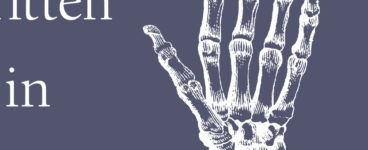
 Written on the Bone
Written on the Bone
‘I would feel I have succeeded if people can become more comfortable to talk about their own death a …
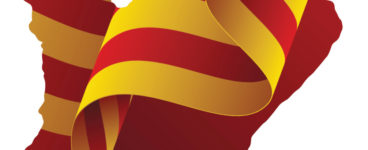
 The Case of the Catalans
The Case of the Catalans
‘The perception that further autonomy was not possible within Spain, and the trend towards recentral …





